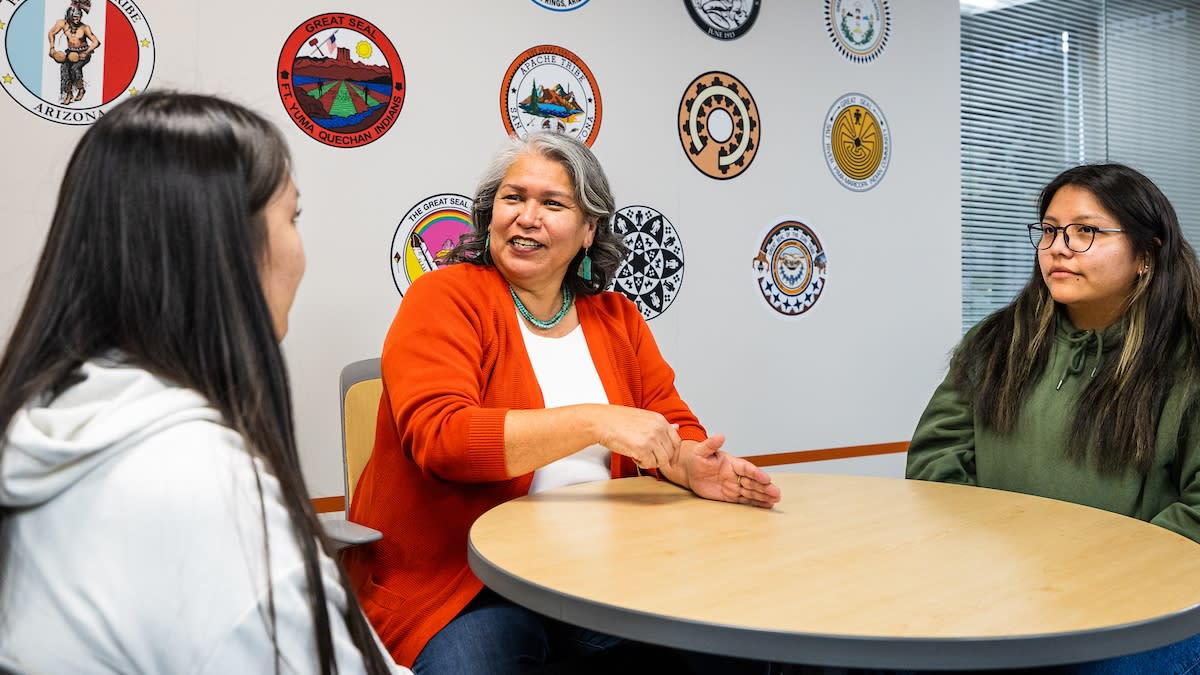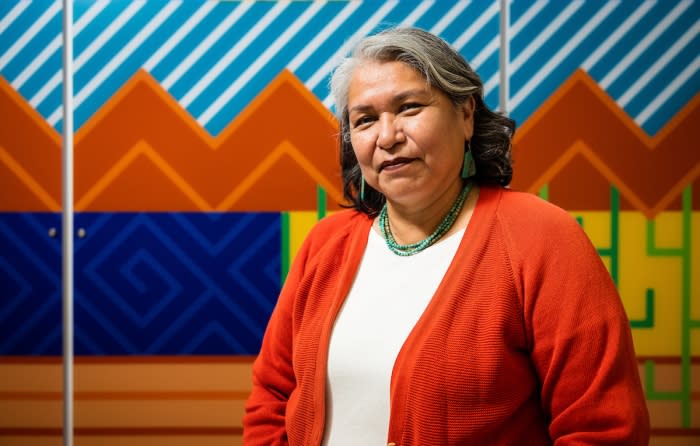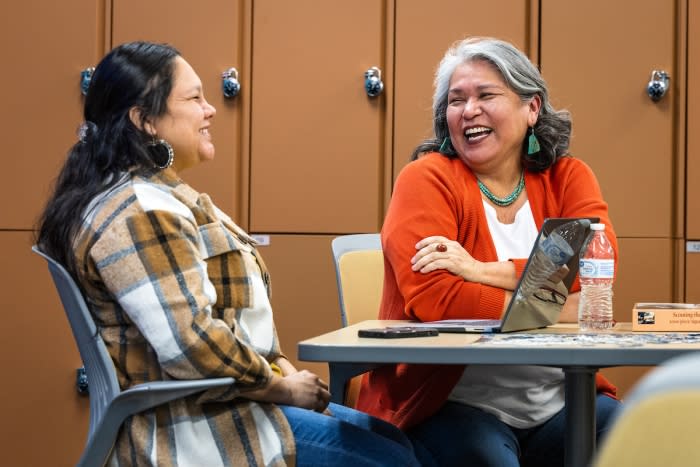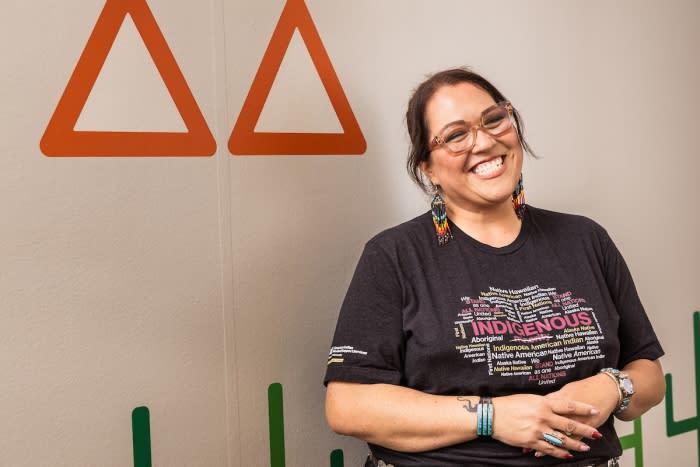'A home away from home': ASU Elder-in-residence Program Provides Indigenous Students with Community, Counsel and a Taste of Home

Madison Billy thought it would be another routine day on Arizona State University’s Downtown Phoenix campus, hanging out and taking a break with her friend Nizhoni James.
The first-year student from Tuba City, Arizona, couldn’t have known in the afternoon she’d be having the kind of conversation that would move her to tears.
Editor's Note: This article was originally published by ASU News. Used with permission. All rights reserved.
The discussion — an informal talking circle — took place on Feb. 13 in a space designated for Indigenous students like Billy, who is Hopi and Navajo, and James, who is Navajo. They spoke of home, community, family, ancestry, the need to look out for one another and hold each other accountable, and friendship.
It was led by someone who knew these issues well. Someone who was Native herself. And that made all the difference.
“I didn’t think I’d cry today,” said Billy, who is studying clinical exercise science in the College of Health Solutions. “I just miss my mom a lot. Just being able to talk to her about my day. I don’t call her as often as I’d like but I miss hearing her voice. It brings a sense of comfort.”
Billy and James were taking part in ASU’s elder-in-residence program, a new universitywide initiative geared toward making Native students feel better prepared for the college experience and fostering a sense of belonging and community.
Like many other universities in the United States and Canada, ASU recognizes the unique needs of its Indigenous students and is extremely mindful of its obligation to make them feel at home and help them earn a degree, says Jacob Moore, vice president and special advisor to the president on American Indian affairs.
“Elder-in-residence programs affirm and reinforce Indigenous identity for Native students that sometimes struggle with the cultural incongruities that can be very different in a major university setting,” Moore said. “Celebrating Indigenous cultural understandings not only helps strengthen student resolve to succeed, but it also helps to raise cultural awareness and sensitivities for university staff and faculty that have an active role in their success, as well.”
The program was launched by ASU’s American Indian Student Support Services in fall 2022, when they hired two Native American elders from the local community to counsel and support Indigenous students. They give talks, host events and participate in meaningful discussions at all four ASU campuses.
The elders-in-residence, who work 15 hours a week, are there to bridge the gap between families and students with the hope of increased retention for American Indian students by building connection and community to strengthen a sense of belonging, student learning and success.
It’s already having an immediate impact on students, according to ASU’s Vickie Baldwin.
“Indigenous peoples often look to their elders for prayers, guidance, wisdom and strength,” said Baldwin, student success and retention coordinator in American Indian Student Support Services. “These teachings are from a cultural and traditional perspective, and our elders-in-residence are teaching our students how to integrate all of these aspects to make it work for the benefit of them.”

Janelle Allen serves as an elder-in-residence at the Downtown Phoenix and West campuses. Allen, who is Cherokee and Navajo, said the new ASU position is “a dream job” and a “full circle” moment for her.
“I’ll never forget the day I stepped foot on this campus,” said Allen, a speaker, motivator, advocate, teacher, healer and graphic designer. “I literally stepped on the sidewalk and could feel the presence of my father, who ran away as a little boy, slept in a car on Lemon Street, ate bologna sandwiches — all to get his education at ASU, where he completed his master’s in social work. Now it’s come full circle for me.”
Allen said she wants to continue her father’s legacy of motivating the next generation to seek higher education and empower them to use their knowledge to serve Native communities as well as others.
So far, she has served his memory well. Allen has taught incarcerated populations in prison and developed mission teams from the Midwest to venture onto the Navajo Nation to serve those in need. She has also provided parenting courses for Native communities hoping to break cycles of trauma with the understanding that parenting is a “sacred role.”
“I’m in my winter season and it’s a really beautiful thing,” said Allen, who in 2016 built a therapeutic art program to help Indigenous people battling addiction. “My duty is to give students my knowledge, my care, my nurturing. I’m there to walk alongside them, offering insight, giving them an opportunity to tell me what’s going on with their lives, lift them up.”
Allen said she prays to and from her light rail commute from West Valley to the Downtown Phoenix campus.
“I’m praying for the students. I’m praying for the space. I’m praying for whatever these students are encountering,” Allen said. “I want this space to be so sacred that when student walk in here, they can feel it ... so that they know it’s filled with love, teaching, care and concern.”
Amber Means, who is Hopi and Lakota Sioux, certainly knows this. She has developed an affinity for Allen in a short amount of time and continually seeks her comfort and counsel.
“As an Indigenous person, it’s important to have access to an elder because of the support and wisdom they offer,” said Means, who is a third-year student pursuing a degree in social work. “They carry wisdom, knowledge and stories that are important to our culture. And Janelle brings comfort in times of distress.”

Means is referring to a recent misunderstanding she had with someone on campus because of their cultural differences. She said that Allen, whom she views as a “grandma figure” was able to help her resolve the issue with grace and dignity.
“I was not very happy that day and quite distraught. But it was nice to come here and interact with Janelle and tell her what happened and how I felt,” Means said. “Janelle was able to support me and advise me in the steps to advocate for myself. We also talk about resumes, what’s it’s like to work with clients, terminology and concepts I’ve learned in class. I have goals, and because she knows the field, she can guide me.”
Esther Nystrom, who is an elder-in-residence for the Tempe and Polytechnic campuses, echoed that the issues students bring to her can be both academic and personal. Her job, she says, is to listen and provide gentle guidance.
“Sometimes I’ll spend four or five hours with a student because I’m like an auntie to them,” said Nystrom, who is Navajo. She was hired from Mesa Public Schools and is the owner of Bitterwater Design, a Native American cultural education and arts enterprise.
“I don’t stress them out," Nystrom said. "You come talk to me and I’m going to ask what they’ve done this weekend. I feed them, get them smiling, and give them the time and space to talk. Most of our students are from the reservation, and that comes with a whole set of challenges.”
Nystrom said those challenges extend far beyond homesickness. It includes Indigenous ways of knowing and ways of being; blending ways in which they acquire knowledge; how building community can foster cultural strength; how they interact with others who are not Indigenous, and strengthen their own cultural understandings while also pursuing scholarly work outside of their own communities.
“The challenges have nothing to do with the classroom or academics — these students can do the work. It’s all about support,” Nystrom said. “They miss home. They miss grandma cooking in the morning, making coffee.
"(These students) usually have to get up and put the wood in the stove, start the fire, feed the animals, fulfill their responsibilities. They have none of that while they’re here. Everything is different.”

Marcil Roanhorse said that was her experience when she first arrived in Tempe from Cornfield, Arizona, a native village on the Navajo Reservation with a population of less than 300 people.
“I was very awkward and shy my first year or two at ASU,” said Roanhorse, who is a fourth-year American Indian studies major. “I only came to campus to go to class, and I’d leave immediately. I had anxiety all the time. And then I found out about this place.”
This place was the third floor of Discovery Hall on the Tempe campus, where American Indian Student Support Services has several rooms and inclusive spaces that incorporate cultural conscientiousness and social identity. It's also where Indigenous students can study, meditate, socialize, pick up food resources, receive career and academic counseling from retention coordinators, check out a laptop, use computers and even get free printing — the latter a hit with Roanhorse.
“When I heard they had free printing, I was like, ‘OK, I’ll go here,'” Roanhorse said. “Then I figured out it was a space for American Indian students. Then I realized I could study here. I can heat up my food. I can just be here and be myself.”
And now she has an elder who she can talk to, and someone who reminds her of home.
“Sometimes Esther will come in wearing turquoise and beads, and she reminds me of an auntie on my mom’s side of the family,” Roanhorse said. “I can talk to her about things I’ve been experiencing — like feelings of loneliness because I have no family here. I’ve come to realize that home isn’t like a location. It’s more about the people that I associate home with.
“And with this space, I now have a home away from home.”
About the Author: "Levi \"Calm Before the Storm\" Rickert (Prairie Band Potawatomi Nation) is the founder, publisher and editor of Native News Online. Rickert was awarded Best Column 2021 Native Media Award for the print\/online category by the Native American Journalists Association. He serves on the advisory board of the Multicultural Media Correspondents Association. He can be reached at levi@nativenewsonline.net."
Contact: levi@nativenewsonline.net

